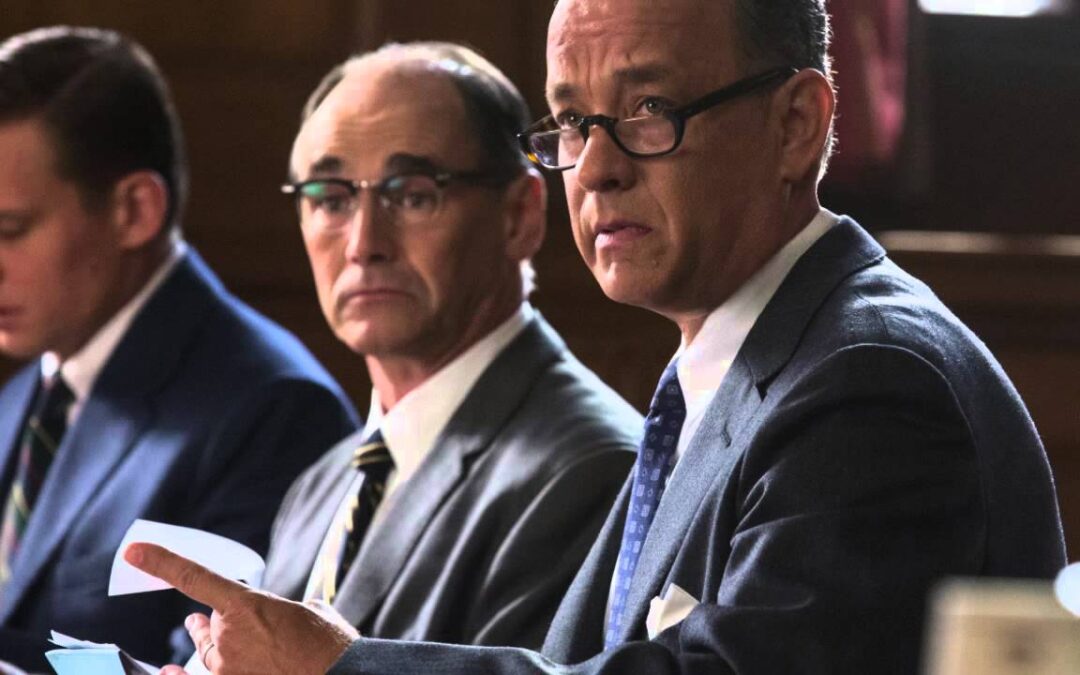A Steven Spielberg historical drama has become something that, even at its worst, ends up being a respectful tribute to its subject. Spielberg cares about the details, and he works hard to give his audience an authentic experience.
But sometimes, as is the case with his latest film, “Bridge of Spies,” his love for the details gets in the way of his telling a single, compelling story. Like an overly enthusiastic 8-year-old being asked about their first day of school, Spielberg can’t decide if he wants to tell you about his teacher, or his new best friend, or the playground, or the bird’s egg he found at recess that’s currently in his lunch pail, or that the tree where he found the egg would be a really good climbing tree but the yard monitors said he’s not allowed to climb any trees and needs to stay on the playground.
For some paying ticket holders, the details are where the fun is. Being transported to a different time with a storyteller enthusiastic about every specific is worth the price of admission. And if you’re that person, “Bridge of Spies” is a must see.
If you’re someone, however, who demands a beginning, middle and ending from your moviegoing experience, “Bridge of Spies” might be a tougher sell.
Like always, let’s chat about the highlights:
Overview
“Bridge of Spies” is a based-on-true-events Cold War story. Following James B. Donovan (Tom Hanks) as he goes from insurance attorney to international prison negotiator, “Bridge” examines multiple aspects of wartime espionage and the chess match governments play to keep their secrets. At its heart, it asks the question of what it means to be American. Around the edges, “Bridge” is both a courtroom drama and slowly baked political thriller.
The performances
If there’s one thing Hanks has proven he’s great at, it’s playing an average guy dropped into extraordinary circumstances. “Bridge” then acts as a perfect fit for Hanks, and his sincere and convincing portrayal of Donovan can be numbered among the many reason to give “Bridge” a chance.
But while the weight of the film rests on Hanks more-than-capable shoulders, Mark Rylance’s portrayal of Russian spy Rudolf Abel is perhaps the highlight of the company.
Rylance is tasked with portraying Abel, an enemy to Donovan and his country, as not only a sympathetic character, but one you’re actually rooting for by the end of the film. As it turns out, not only does he end up becoming the only prisoner you’ll care about in the movie, but he does so without ever giving you a reason to trust him.
“Bridge” could have used a lot more Rylance.
Behind the camera
The amount of talent behind “Bridge” is pretty overwhelming. Not only is Spielberg directing, but Ethan and Joel Coen are responsible for the script — though it should be noted Matt Charman helped with writing efforts as well.
With the combined creative powers of Spielberg, Hanks, the Coen brothers and some guy named Charman, “Bridge” seems like it it should be a definitive contender for best movie of the year, and I’m sure there will be some who argue it absolutely is.
However, there will be enough people unable to stay awake throughout the 141-minute runtime that “Bridge” could be completely forgotten come 2016, and that’s a surprising possibility. Spielberg plus Hanks plus the Coen brothers should equal entertainment alchemy. Unfortunately, for many, it will just equal a 141-minute nap.
Is it engaging?
This category will probably be a polarizing topic during water cooler chat. As the events surrounding Donovan play out like a slow-motion falling domino chain, some audience members will inch closer to the edge of their seats in anticipation while others check their watches and try to stay conscious.
This hinges largely on the fact that “Bridge of Spies” is separated into two acts. The first focusing primarily on Abel’s court case, and the second Donovan’s international prisoner swap negotiations. Both are fascinating on their own, but the mid-movie reset asks a lot from viewers, especially as an almost entirely new set of characters is introduced for part two.
The other element people might find jarring are the random side-stories that introduce and follow the American prisoners. The sub-plots do little to make us care about the captured characters, and if you’re already on the fence about the movie’s direction, the additional asides might just push you over the edge.
Conclusion
There is so much to like about “Bridge of Spies” that it’s easy to see why most critics are celebrating this project as another win for Spielberg. The setting, characters and message driving the film are all wonderfully executed.
But “Bridge” is one of those films that’s more about the experience than the destination, and if you know that going in, there’s a good chance you’ll really enjoy Spielberg’s latest historical effort. If you don’t have the energy to invest however, you might want to put “Bridge” on your when-it-comes-to-Netflix list and just go see “The Martian” again this weekend.
Originally published KSL.com

Recent Comments